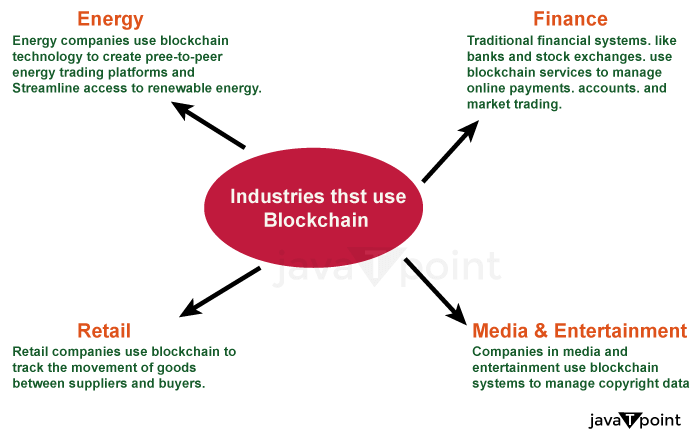Have you ever wondered how technology could change the way we conduct business, interact with each other, or even manage our own data? One of the most fascinating innovations in recent years is blockchain technology. It’s not just a buzzword; it’s a transformative force that is revolutionizing various industries.

This image is property of media.geeksforgeeks.org.
Understanding Blockchain Technology
Before I dive into how blockchain is changing various sectors, I feel it’s essential to lay a solid foundation of what blockchain actually is.
What is Blockchain?
At its core, blockchain is a distributed ledger technology that records transactions across several computers in a way that the registered information cannot be altered retroactively. This offers a high level of security and transparency, making it incredibly appealing for numerous applications.
Key Features of Blockchain
-
Decentralization: Unlike traditional databases, blockchain is decentralized. This means there’s no single point of control or failure, which enhances the system’s integrity.
-
Transparency: Transactions on a blockchain are visible to all participants, bringing about a sense of trust among users.
-
Immutability: Once a transaction is recorded on a blockchain, it is nearly impossible to change. This reduces the chances of fraud significantly.
These features highlight just why blockchain is becoming such a hot topic among businesses, governments, and individuals alike.
Blockchain in Finance
One of the first industries to embrace blockchain technology was finance. It’s fascinating to see how it’s transforming this sector!
Cryptocurrencies and Beyond
Initially, when most people think of blockchain, they think of cryptocurrencies like Bitcoin or Ethereum. While these digital currencies were the pioneers, blockchain’s potential in finance goes far beyond them.
Improving Transactions
In the realm of finance, the ability to execute transactions securely and quickly has been revolutionary. Traditional banking methods often involve multiple intermediaries, which can slow down transactions and increase costs. Blockchain eliminates many of these layers, allowing for near-instantaneous transactions.
- Fee Reduction: With fewer intermediaries, the costs associated with sending and receiving money decrease significantly, benefiting consumers and businesses alike.
Smart Contracts
I find smart contracts one of the most intriguing applications of blockchain in finance. These are self-executing contracts with the terms of the agreement directly written into code. They automatically execute transactions when conditions are met, significantly reducing the need for intermediaries in contract execution.
| Feature | Traditional Contracts | Smart Contracts |
|---|---|---|
| Execution Time | Days to Weeks | Immediate |
| Costs | High (Lawyers, Fees) | Minimal |
| Security | Vulnerable | Highly Secure |
Blockchain in Supply Chain Management
The supply chain is another arena where blockchain’s impact is profound.
Enhancing Traceability
In supply chain management, transparency and traceability are crucial. Blockchain allows businesses to track products from their origin to the end consumer seamlessly. This means I can finally verify that the avocado I bought is truly organic and not a deceptive label.
Real-Time Monitoring
With blockchain, companies can monitor their supply chain in real time, providing up-to-date data on product conditions and locations. This real-time capability plays a crucial role in areas such as food safety.
- Recall Management: If a product is found to be unsafe, companies can quickly find and remove it from shelves.
Fraud Prevention
The immutability and transparency of blockchain make it nearly impossible for bad actors to alter or falsify information in the supply chain.
| Feature | Traditional Supply Chain | Blockchain Supply Chain |
|---|---|---|
| Information Sharing | Limited | Transparent |
| Tampering Risk | High | Very Low |
| Recall Efficiency | Slow | Fast |
Blockchain in Healthcare
I find the healthcare industry particularly exciting when it comes to blockchain applications. The potential benefits here are astounding.
Secure Patient Data
One of the most significant issues in healthcare is the security of patient data. With blockchain, I can confidently say that patient records can be secured and shared with authorized personnel without fear of interception or unauthorized access.
Enhanced Interoperability
Blockchain can facilitate better communication between different healthcare providers. This interaction means that I can have my medical records accessible wherever I go, making healthcare more efficient and patient-friendly.
Drug Traceability
Blockchain also provides a mechanism to track pharmaceuticals from manufacturers to the end-user, helping to combat counterfeit drugs.
| Challenge | Traditional Approach | Blockchain Approach |
|---|---|---|
| Counterfeit Drugs | Widespread Problem | Traceable Path |
| Record Accessibility | Fragmented Systems | Unified Access |
| Security Breaches | Frequent | Highly Secure |

This image is property of images.javatpoint.com.
Blockchain in Real Estate
The real estate market can be a maze, but blockchain is here to simplify things.
Simplifying Transactions
Buying or selling property often involves mountains of paperwork and numerous intermediaries. Blockchain allows for streamlined transactions by digitizing property titles and facilitating direct sales.
Minimized Fraud
With traditional property transactions, fraud is a constant concern. The immutable nature of blockchain means that title history and ownership records cannot be altered, significantly reducing the chance of fraudulent claims.
| Aspect | Traditional Real Estate | Blockchain Real Estate |
|---|---|---|
| Transaction Time | Days to Weeks | Hours to Minutes |
| Intermediary Costs | High | Low |
| Fraud Risk | Significant | Minimal |
Blockchain in Voting
I find the application of blockchain in voting to be both innovative and necessary in today’s world.
Increasing Trust in Elections
Blockchain technology can offer a transparent and secure method for conducting elections. By allowing votes to be securely recorded and immediately counted, it eliminates many of the concerns regarding election integrity.
Voter Accessibility
Blockchain could also allow more people to vote securely from their own devices, making the voting process more accessible.
| Feature | Traditional Voting | Blockchain Voting |
|---|---|---|
| Counting Time | Days | Instant |
| Fraud Potential | High | Very Low |
| Voter Participation | Limited | Increased |

This image is property of www.solulab.com.
Challenges of Blockchain Adoption
It’s important to acknowledge that while blockchain holds immense potential, there are challenges to overcome.
Regulatory Implications
As I look at the landscape of blockchain technology, I see regulations trying to keep up with innovation. There’s still a lot of uncertainty surrounding how governments will regulate blockchain-based business models.
Technical Barriers
While blockchain has a lot to offer, not all companies are equipped to implement such systems. The technical knowledge and infrastructure required can be a significant barrier for smaller organizations.
| Challenge | Current Impact | Suggested Solutions |
|---|---|---|
| Regulatory Uncertainty | Hinders Innovation | Clear Guidelines |
| Infrastructure Cost | High Investment | Public-Private Partnerships |
| Knowledge Gap | Slows Adoption | Educational Programs |
The Future of Blockchain
As I reflect on what the future holds for blockchain technology, I can’t help but feel optimistic.
Potential for Integration
I see a future where blockchain becomes integrated into more everyday applications, perhaps in areas like digital identity verification or even in renewable energy credits.
Continued Evolution
Like all technology, blockchain will continue to evolve. New platforms and solutions will emerge to address current challenges and enhance security, scalability, and usability.

This image is property of www.appletechsoft.com.
Conclusion
In conclusion, I am continually amazed by the potential of blockchain technology to impact numerous industries positively. From finance and healthcare to real estate and voting, its applications are wide-ranging and profound. As I look ahead, I am excited about the innovations that will emerge as more individuals and organizations embrace this technology.
Adopting blockchain may pose challenges, but the potential rewards far outweigh these obstacles. I believe a future where blockchain is part of our daily lives is not far off, and it’s a future that promises increased efficiency, security, and trust across the board.
Reflecting on everything, I am left with one thought: blockchain is not just changing industries; it is shaping the future.





